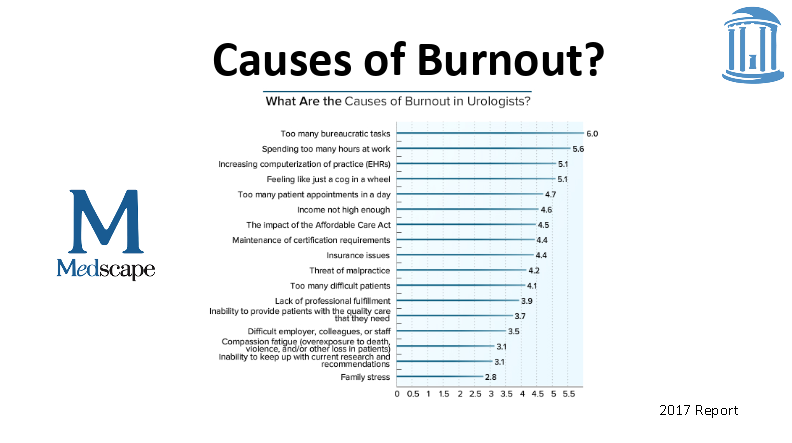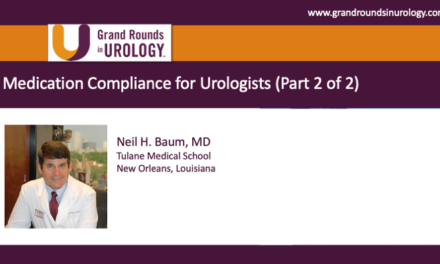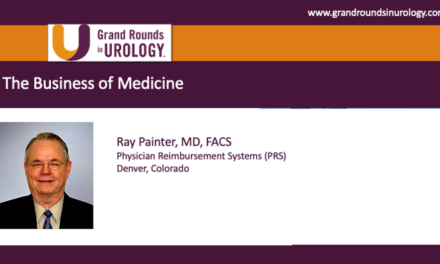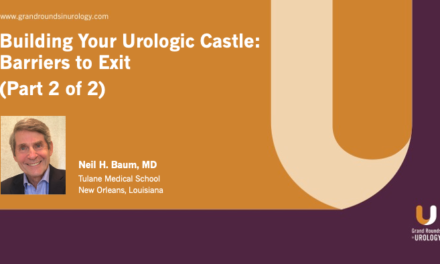Gerald L. Andriole, Jr., MD, presented “Physician Burnout – What Can We Do To Prevent It?” during the 29th Annual International Prostate Cancer Update on January 26, 2019 in Beaver Creek, Colorado.
How to cite: Andriole, Jr., Gerald L. “Physician Burnout – What Can We Do To Prevent It?” January 26, 2019. Accessed Dec 2024. https://dev.grandroundsinurology.com/physician-burnout-what-can-we-do-to-prevent-it/
Physician Burnout – What Can We Do To Prevent It?
Gerald L. Andriole Jr., MD, addresses the burden of burnout in medical practice, particularly in the urology specialty, and its effect on physicians, patients, and organizations. He then outlines actions individuals, healthcare organizations, and national institutions can take to alleviate this problem.
Abstract:
Burnout among urologists occurs in about 40% of practitioners. Multivariant analysis revealed that urologist burnout correlates with more patient visits per week, younger age, being in a subspecialty area other than Pediatrics or Oncology, in low- or multi-specialty practices, and greater number of work hours per week. Burnout affects how physicians practice and patient outcomes, as well as the culture and prosperity of organizations and healthcare systems.
Physician burnout needs to be addressed on the individual, organizational, and national level. It is necessary to employ national efforts to alleviate the burdens of documentation and clarify the use of non-physicians for tasks such as documentation. The National Institutes of Health (NIH) should consider supporting research that would evaluate the implications of clinician well-being on the quality of healthcare delivery.
Insurers can play a role in addressing this issue by simplifying the coding and filing process. The American Board of Medical Specialties (ABMS) and various licensing boards should simplify maintenance of certification requirements. Healthcare systems should routinely assess physician wellness and strive to develop new practice models that maximize physician efficiency as well as reduce non-clinical burdens.
On a personal level, physician should strive for wellness by nurturing personal and professional well-being. Finally, medical schools and residency programs should teach and emphasize physician wellness.
About the International Prostate Cancer Update
The International Prostate Cancer Update (IPCU) is an annual, multi-day CME conference focused on prostate cancer treatment updates. The conference’s faculty consists of international experts, and the event caters to urologists, medical oncologists, radiation oncologists, and other healthcare professionals. Topics encompass prostate cancer management, from diagnosis to treating advanced and metastatic disease. Dr. Andriole presented this lecture during the 29th IPCU in 2019. Please visit this page in order to learn more about future IPCU meetings.
ABOUT THE AUTHOR
Gerald L. Andriole, Jr., MD, is the Robert K. Royce Distinguished Professor and Chief of Urologic Surgery at Barnes-Jewish Hospital, the Siteman Cancer Center, and Washington University School of Medicine in St. Louis, Missouri.
Dr. Andriole received his medical degree from Jefferson Medical College in Philadelphia, Pennsylvania. He trained in surgery at Strong Memorial Hospital and the University of Rochester and completed his Urology Residency at Brigham and Women’s Hospital and Harvard Medical School. Subsequently, he was a Fellow in Urologic Oncology at the National Cancer Institute in Bethesda, Maryland.
Dr. Andriole has over 35 years of consistent contributions in the areas of BPH and prostate cancer screening and prevention research. He has contributed well over 400 peer-reviewed publications and serves on the editorial boards of several prestigious journals. He is Chairman of the Prostate Committee of the National Cancer Institute’s Prostate, Lung, Colorectal and Ovarian (PLCO) Cancer Screening Trial, and PI of the NIDDK Multidisciplinary Approach to Urologic Pelvic Pain (MAPP) and Symptoms of Lower Urinary Tract Dysfunction Research Network (LURN). He was Chairman of the Steering Committee of the REDUCE Prostate Cancer Prevention Trial, as well as PI of both the NIDDK Medical Therapy of Prostatic Symptoms (MTOPS) BPH trial and the NIDDK Complementary and Alternative Medicine for Urinary Symptoms (CAMUS) study. He is a member of the American Urological Association, the American Association for Cancer Research, the American Society of Clinical Oncology, the American Surgical Association, the American Association of Genitourinary Surgeons, and the Clinical Society of Genitourinary Surgeons, among other societies.






